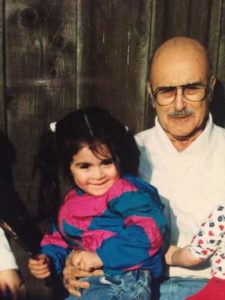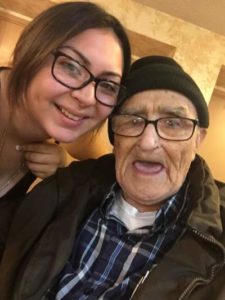Adjusting holiday celebrations
While holiday celebrations are often joyous occasions, they can also be challenging and stressful for families affected by Alzheimer’s or a related disorder. While family traditions still matter, making some adjustments may help everyone enjoy the holidays together. Sometimes it helps to create new traditions.
We asked Alzheimer’s Association staff, volunteers and caregivers for their holiday tips. We are sharing their suggestions on how flexibility, patience and a focus on connection can be helpful.
Flexibility
“Be flexible. When someone is living with Alzheimer’s it can help to focus on being in the moment and connecting. That’s what we want out of family times,” says Bonnie Rea, Family Care Specialist with the Alzheimer’s Association, Northern California and Northern Nevada Chapter. “Sometimes it’s about relaxing some of those traditions and focusing on how you want to connect with your loved one.”

Patience
Nia Sanchez lost her grandfather, Luis Martinez, to Alzheimer’s a couple of years ago. She encourages everyone to “just have patience, a lot of patience.” Her Grandpa Luis would frequently think he was living in his home country of Mexico.
“We would just go with that,” Nia says. “We wouldn’t say, “˜No grandpa. You’re in the U.S.’ We would just let him be and think what he wanted.”
Making adjustments
Bonnie agrees that the holidays can be an especially confusing time for somebody living with dementia. “You usually don’t have to make huge changes if your loved one is in the early stage of the disease,” she says. Some minor adjustments, such as ensuring rest breaks between activities, might be helpful.
“In the middle and late stages, their insight is more impaired and it may be more difficult for them to participate in some activities. It helps to be mindful of our expectations and consider what adjustments we can make.”
A different schedule
Scheduling the holiday meal as an afternoon lunch or early dinner “” or even a brunch “” might help avoid problems for those affected by late-day confusion and mood or behavioral changes (known as sundowning).
Hosts might decide to replace the traditional large family gathering with several smaller get-togethers spread throughout the holiday season. This can be especially helpful when trying to accommodate those living with Alzheimer’s who grow anxious, angry or tired in large groups or unfamiliar surroundings.
Environmental changes
When the day arrives, there are small steps that can help create a safe and calm environment. Bright, blinking Christmas lights may be confusing and disorienting to some with Alzheimer’s. Avoid fake fruit in table settings that one might confuse with edible fruit. Set aside a quiet space in the house where the family member can go to relax and take a short break from the noise and commotion, or even take a nap.

“Just going into a bedroom, a quiet room, and being together can help,” says Merry Geil, a longtime Alzheimer’s Association volunteer support group facilitator. “They may not know why they are there: “˜Why are all these people here? Oh. It’s Christmas.’ But then, that idea is gone. Then they want to go home. They might not even have had dinner yet. Maybe suggest they take a nap.”
Supporting the caregiver
Merry also acknowledged the additional stress that caregivers may face during the holiday season. It can help for others to talk with the primary caregiver and identify ways that others can take on some caregiving tasks so the caregiver can take a break.
If the person living with dementia and/or the primary caregiver(s) have traditionally served as holiday hosts, family members may wish to discuss how they can lighten the load this year. Can someone else host the gathering? Visiting family members may want to stay at a hotel. Others can help with the cooking, switch to a holiday potluck or purchase a prepared meal.
Preparing others
Families and friends may be unsure of how to involve their loved one with Alzheimer’s in activities without overwhelming them (or others). One suggestion is to send an email ahead of time to all who will be attending a family gathering, especially if they haven’t seen their loved one lately.
Give an update on what changes they may notice, what activities the person enjoys, and how best to interact. The Alzheimer’s Association has resources you can share on communication, activities and common behaviors.
Helping children and teens understand
Younger children might not notice any difference in their aunt or grandfather’s behavior. Bonnie recommends organizing a supervised activity for the children to engage their older relative, such as decorating cookies together. They can enjoy time together and the focus is on the activity.

For older children and teens who might have questions, Bonnie recommends that an adult participate in the conversation “to guide them around the difficulties. “˜Grandpa is a little forgetful. He may get your name wrong. But that’s OK.'” It may help to talk with them before the event to prepare them and give them suggestions on how to interact.
Focus on what’s important
Nia shared some words of advice and assurance for family members who might be anxious about an upcoming holiday gathering with a relative living with Alzheimer’s. “I know it’s something bad. It’s not going to go away. Just don’t give up. Bring food that they love to eat and just enjoy the time you have with your loved one.”
For more advice and assistance, the Alzheimer’s Association helpline is available 24/7, even on holidays, at (800) 272-3900.
Learn more:

















